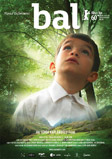24 March 2011
A Son’s Quest, With Nature as a Guide
Andy Webster / The New York Times
The black honey that Yusuf’s beekeeper father collects has always provided for their family. It is a sweet delicacy, but its increasing scarcity drives Yakup deeper into the forests of Northeast Turkey. That sweetness gives way to bitter apprehension in Semih Kaplanoglu’s evocative pseudo-coming-of-age story, ‘Bal.’
The film is Turkey’s recent official submission for best foreign language Oscar consideration, and it opens today in New York.
Though more of the wiry than burly type, Yakup is definitely a manly outdoorsman. Yet, he has forged a remarkably close bond with his sensitive young son, which sometimes even undermines Yusuf’s relationship with his mother. Painfully shy, Yusuf is only able to speak without his stammer when with his father.
Unfortunately, the thinning black bee populations require Yakup to set his hives at greater heights in ever more remote areas of the forest. One night, Yakup fails to come home as expected. Thus begins a long, painful waiting ritual for Yusuf and his mother.
Arguably, that is the film in a nutshell, but for Kaplanoglu, it is the experience that counts, rather than a neatly stair-stepped plot outline. Shot in the mountainous northeast Rize province, “Bal” captures a side of Turkey’s natural beauty rarely seen on film.
His forest shares a kinship with that of “Twin Peaks,” palpably mysterious, and perhaps a bit menacing as well. In fact, he uses the suggestive setting to create an expectation of a third-act foray into magical realism that never really materializes.
By any objective measure, “Bal” is a simple, quiet work. However, those same qualities also give the film a tactile impressionism. Bora Altas’s honest, unaffected performance as Yusuf also helps maintain audience focus throughout the unhurried film. Particularly touching are his early scenes with Erdal Besikçioglu as Yakup, conveying the depth and purity of the relationship.
As uncompromising as “Bal” might be, it always looks stunning, thanks to Baris Özbiçer’s museum-quality cinematography. Still, there is no getting around the exclusive nature ofthe film’s appeal.
This work represents the most rarified of high-end art-house cinema. Hats off to Olive Films for sticking its neck out with releases such as this and Veiko Õunpuu’s “The Temptation of St. Tony.” Artful but demanding, “Bal” opens today (March 25) at the Village East
|
|
|




